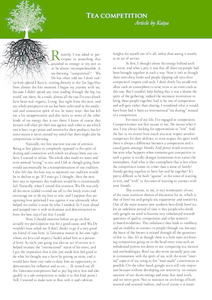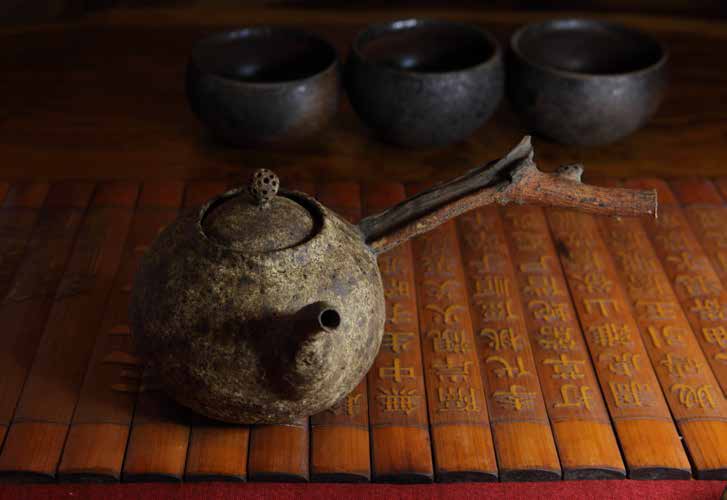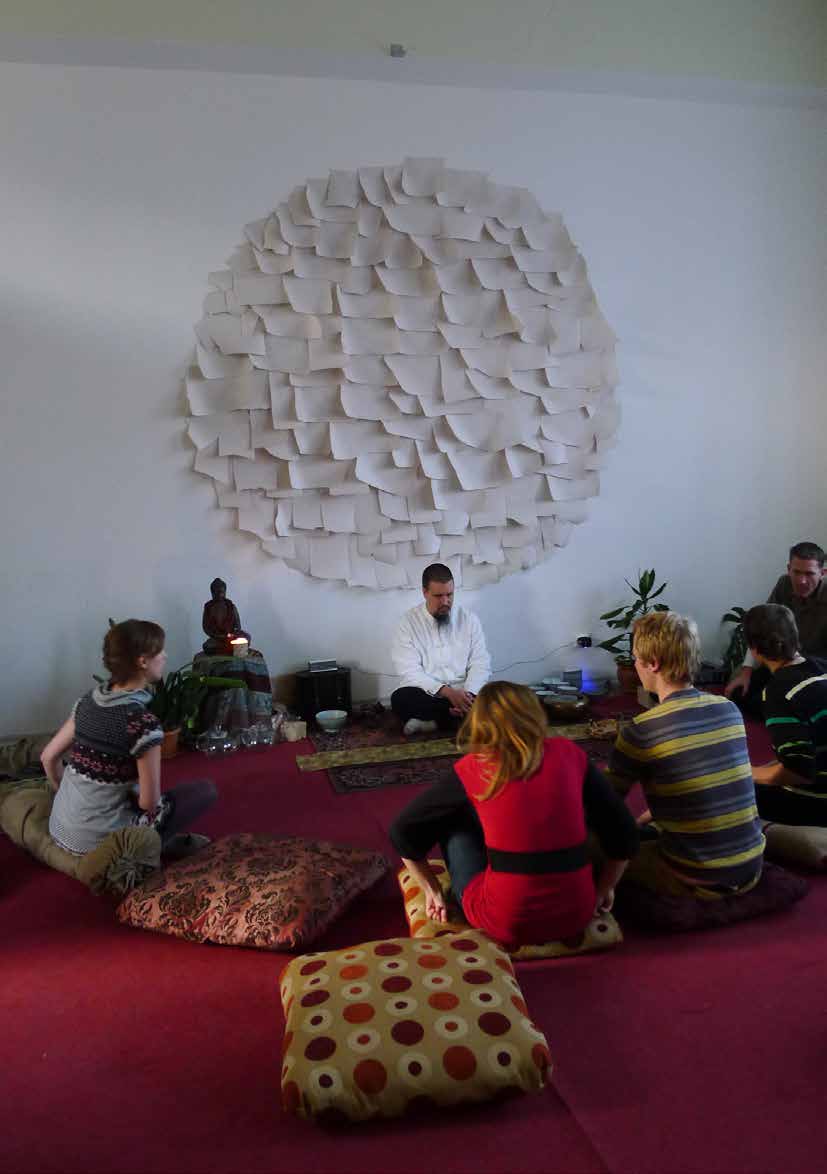
 |
|
Recently, I was asked to participate in something that sounded so strange to my ears as to be almost incomprehensible. A tea-brewing "competition"! Wu De has often told me I don't realize how special I have it, coming directly to the Tea Sage Hut from almost the first moment I began my journey with tea, because I didn't spend any time wading through the big 'tea world' out there. As a result, almost all the teas I've ever drunk have been real, organic, Living Teas right from the start, and my whole perspective on tea has been cultivated in the medicinal and connective spirit of tea. In many ways, this has left me a bit unappreciative and also naïve to some of the other kinds of tea energy that is out there. I knew of course that farmers will often pit their teas against each other to see which one is best, to get prizes and renown for their products, but for some reason it never crossed my mind that there might also be competitions in brewing.
Naturally, my first reaction was one of aversion. Being at first glance so completely opposed to the spirit of sharing and connection with which we always brew our tea here, I wanted to refuse. The whole idea made no sense and even seemed "wrong" to me, and I felt as though going there would automatically be a misrepresentation of our tradition. I also felt that the best way to represent our tradition would be to decline to go. If I must go, I thought, then the next best way to represent this tradition would be to intentionally fail. Naturally, when I voiced this aversion, Wu De was only all the more tickled to send me off to this lovely event and encourage me to do my best to win, and I suppose that recognizing how polarized I was against it was ultimately what helped me realize it must be what I needed. So I went ahead and jumped into it with enthusiasm and determination to brew the best cup of tea that I could.
Now, I should mention before we go on that actually my participation was for a good cause, and Wu De wouldn't have asked me (I don't think) to go if a very good tea friend of ours here, (a Taiwanese master in his own right whom we love and respect,) hadn't asked him as a personal favor. As such, just going was also an act of service as it helped increase the "international" status of his event, and I got the impression that it also just made him feel good to do what he thought was a favor by getting us entry, and it would have been very rude to deny him an opportunity to demonstrate his influence and so on.... (It turned out all the Taiwanese competitors had to pay big entry fees and also qualify in a sub-competition to make it to this final point.) Still, I wanted to make sure to flow with it and cultivate insights for myself out of it all, rather than seeing it merely as an act of service.

At first, I thought about the energy behind such an event, and what a pity it was that all these tea people had been brought together in such a way. Now it isn't as though there were dirty looks and people slipping salt into their competitor's teapots and such. I don't think Tea would ever allow such an atmosphere to arise, even at an event such as this one. But I couldn't help feeling that it was a shame the spirit of the gathering, indeed the necessary motivation to bring these people together, had to be one of competition and self-gain rather than sharing. I wondered what it would have been had it been an international "tea sharing" instead of a competition.
For most of my life, I've engaged in competition. Competitiveness was first nature to me. No matter what it was, I was always looking for opportunities to "win". And the fact is, no matter how much you may respect another competitor for their abilities, or even respect the sport itself, there is always a difference between a competition and a casual game amongst friends. And pretty much everyone has seen what happens when someone gets competitive in such a game: it totally changes (sometimes even ruins) the atmosphere. And what is that atmosphere that is lost when the competition comes in, other than a sense of family/ friends getting together to have fun and be together? It's pretty difficult to be both "against" in the sense of wanting to win, and "with" in the sense of wanting to connect with your friends.
This contrast, to me, is very reminiscent of one of the most common themes of discussion for us, which is that of bowl tea and gongfu tea, equanimity and sensitivity. One of the main reasons new students here drink bowl tea for an indefinite period of time is that people who drink only gongfu tea tend to become very imbalanced towards questions of quality, comparisons and other sensitivity-based modalities. This imbalance then leads to snobbery, and an inability to connect to people through tea, because the heart of the brewer is missed through all the questions of this vs. that. It's as though there is a little mini tea-brewing competition going on in the head every time such an imbalanced person sits down to tea- comparing tea, teaware and methodologies. Bowl tea also more naturally puts one in communion with the spirit of tea, with the more "internal" aspects of tea, using as few "man-made" contrivances as possible. On the other hand, gongfu tea is still very important because without developing our sensitivity, we remain unaware of our shortcomings and areas that need work, and we never grow. Not to mention we are beings of both internal and external realities, and so of course it is necessary to focus our attention on both from time to time. And gongfu tea isn't necessarily external any more than bowl tea is necessarily internal, but that's a topic for another day.
This is a discussion that we've had a million times here at the Hut, and have even discussed here in these newsletters before. I wanted to review it a bit because, actually, even after all those discussions, it wasn't until I went to this event and experienced it for myself that it really started to fully hit me. As I said, I was pretty naïve and came more or less directly here, so as much as we talked of this phenomenon, I hadn't seen it very often, and the result was that I saw a deeper aspect of it I hadn't known about before. Extreme focus on the external, sensitivity-based side of tea practice, ironically, doesn't result in deeper sensitivity to tea: it actually superficializes it! It doesn't seem very logical. You would think that if Person A spent 50 hours drinking bowl tea and 50 hours drinking gongfu tea, and Person B spent 100 hours on gongfu, Person B would at least have stronger sensitivity and a deeper understanding of that side of tea, off balance though they may be. But that is not what I saw at the competition.
The evidence of weaker sensitivity was everywhere. It was in the chaxi, which were all the same, as though they had come out of an instruction manual: they displayed harmony of colors, patterns, shapes and so on, but lacked any motivational spirit, any theme, any reason other than to follow the rules and formulae of aesthetics. It was in the fact that there were rules, set in stone things you could do and you could not do or you would lose points from the judges. It was in the fact that the huge majority of the competitors spent at least 75% of their time preparing for the competition with a box of make-up and a mirror. We were literally the only competitors that day who actually made tea during the nine-hour day of waiting our turn to compete! We were also the only competitors who brought our own water, which is a really strange thing to have set us apart in a gathering of tea brewers, especially when the alternative was Taipei hotel tap water. There was even an article in the newspaper couching the whole event in terms of "Taiwan vs. the World!" But perhaps the greatest, most obvious evidence that the focus was shallow, was the fact that the person who brewed the best cup of tea, according to their own standards, didn't win the competition! That's how much value was given to the six or seven other superficial elements involved in the total score. The person who made the best tea received an "honorable mention" plaque and a small token prize only, because concerns such as their chaxi, the way they answered some questions about tea (knowledge of tea), their "style", personal appearance and so on outweighed the tea itself! How absurd!
So this deeper insight into the way that bowl tea and gongfu tea work together was the big lesson of the day for me. There is no doubt that most all of the competitors there probably have drunk more tea in their lives than I have many times over, and all of it was gongfu, and all of it was focused on developing an ability to find the nuances in a tea and compare it with other teas, possibly comparing teaware and brewing methods as well. But drinking tea only in this way quite naturally results in an objectification of tea, and the moment we objectify anything or anyone, the relationship becomes superficial and lacks that depth of spiritual connection that is in fact available to us in all forms, whether they have eyes to look back at us or not. We have to look for this in our tea, or suffer the consequences. And the results are obvious: when tea is objectified, there is no longer a real or meaningful connection. Without that, next thing you know there are rules and regulations, definitions, rights and wrongs, dos and don'ts, and quite poignantly and ironically, what actually makes a good cup of tea is completely lost in all the hullaballoo and seeking to grasp what makes a good cup of tea!
The good news is that this is merely the insight I cultivated out of the general energy of this event, the structure and spirit from which it arose, and didn't represent the specific people I met there as a whole. As I said, it wasn't as though people were walking around "accidentally" shoulder-smashing in the halls. Tea is Tea, and there is only so much competitive spirit that is really possible around Her. Although there was a good bit of stand-offishness and self-concern, and not much "official" time for mingling or sharing, it wasn't as though it wasn't there at all. There were plenty of smiles and encouragement and congratulations going around with plenty of good nature. And when we brewed tea, at least a few people took the time out of applying their make-up and other business to sit down for just a cup or two. It wasn't as though the competitive atmosphere stopped tea spirit from shining through, but it most certainly did get in the way. And as was to be expected, there are always those at a tea event that have absorbed more tea spirit than others.
Meeting just one such fellow Chajin is more than enough to make the journey worth it. In particular, we met one nice foreign competitor who I can honestly say had absolutely not a single drop of anything other than open beginner's mind, and was just there to drink it all in. And actually, there was a potentially good event scheduled, the evening after the competition, for all the competitors to just sit down at tables and make tea for anyone that wanted to join, including other competitors. But unfortunately it was cancelled. I imagine that had this event been scheduled before the competition, and not been cancelled, it would have been a completely different event.

In fact, I'm not even sure that the event itself is necessarily imbalanced. As with all things, the way it is approached and structured is also important. So I am open to the possibility of a similar gathering with a similar focus on sensitivity that also brings out the finest qualities of tea, while maintaining an atmosphere of a gathering of brothers and sisters. That wasn't this event (as a whole), but it could have been, and we did our best to at least represent this tradition by making it as much like that as we could, in spite of the structural obstructions that were in the way.
I can honestly say that aside from my personal aversions (which alone would have been worth facing), I jumped into this competition feet-first and without resistance. I did everything I could to make the best cup of tea possible, infused not with the spirit of defeating, but with the spirit of sharing just that: the best cup of tea I could. That was my way of participating without participating, I suppose you could say. We made a 4AM trip to a mountain spring to gather water, used a silver kettle, my best zisha pot, saucers and antique cups, and did plenty of experimenting with brewing methods to get the hottest possible cup of tea over the twenty-foot distance from myself to the judges (not to mention slavishly drilling my cha-tong Shane on the simple act of picking up the tray, walking it to the judge's table, walking back, sitting down, etc.). The result? Third-to-lowest score on "best cup of tea" out of twenty competitors! (It was our lowest score in all the categories, though we ended up at about 9th overall) So, I actually ended up where I started out, failing, although with the added bonus of failing unintentionally. And I can't deny that my third cup was quite obviously oversteeped, so that was also a great lesson about teaware and remembering that without listening to the tea, the finest water and teaware in the world are of no consequence.
Our friend, however, (who was one of the minor judges) encouraged us and said he didn't agree with the end result at all, and all I had to see were his big smiles, his thumbs-ups and the photos he kept snapping as I was brewing tea (even though he was supposed to be judging at that moment!) to know it had been time well-spent, not only for my own cultivation of insight, but as an act of service and, poignantly, connection to a good tea spirit and friend, as well as an opportunity (no matter how briefly) to touch a few kindred spirits here and there through one or two brief cups of tea.
In the end, as usual, I have my practice, and the balance between bowl tea and gongfu tea in particular, to thank for getting as much out of this experience as I did. On the one hand, I found and explored the shortcomings of the event. I didn't ignore them or pretend they weren't there, focusing only on the positives. I used them to cultivate new insights and deeper understanding of an old lesson, which resulted in growth. At the same time, I saw that it was important to be open to the possibility of inspiration even in such circumstances, and met at least one really beautiful and bright young tea spirit as a result, which gave me the opportunity to see first-hand that Tea manages to shine through and be there underneath any amount of egotistical human baggage that might be on top.
